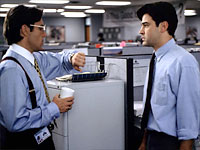Linguistic gobbledygook has taken over America's conference rooms. Put a stop to the nonsense.
For people bent on achieving superstar status in the business world, knowing one language is often not enough. Unfortunately the second tongue most popular to many American corporate types isn't Spanish, German, French, Italian or Chinese. It's jargon, a heinous amalgamation of terms with unknown origins and delivered with no explanation, irony or even a crumb of guilt. Business clichés have long been allowed to proliferate, multiply and slink around like evil gremlins within the American business establishment.
History books don't denote when our business culture cut its anchors to the English language. But perhaps one day our tomes will record exactly when the jargon-slingers took over. And make no mistake, they have taken over.
Jargon-slingers lurk everywhere. They're neighbors, bosses, co-workers and relatives.
They don't wear tattoos or badges on their chests. They can penetrate the most sacrosanct of organizations and have a knack for showing up on the speaker lists of conventions. Knowing them by sight is impossible. So keep a vigilant ear to the air and an eyebrow raise at the ready. Let the jargon slinger know that you know who they are: a vapid, message-clouding, English-avoiding, communications nightmare.
Jargon-slingers often want to be your buddy. They'll offer to touch base, circle the wagons and get people working on the same page. They want to grab low-hanging fruit and move the needle.
But jargon-slingers' vocabulary hieroglyphics often limit everyone's bandwidth when the troops really just want to drink from a high-level fire hose while the cement is still wet and the competition is still in the weeds. It's an issue that can bedevil otherwise effective people from soup to nuts and keep them from becoming the kind of game-changing paradigm-shifters that companies need to take it to the next level.
In other words, Jargon can complicate the most simple of messages. So why in the name of Webster's does the inscrutable babble persist?
"People use jargon because they want to sound smart and credible when in fact they sound profoundly dim-witted and typically can't be understood, which defeats the purpose of speaking in the first place," says Karen Friedman, author of Shut Up and Say Something: Business Communication Strategies to Overcome Challenges and Influence Listeners (Praeger, 2010).
Of course the real victims are the listeners who, because their bosses can't verbalize ideas well, are subjected to jargon. The result: "Listeners get bored out of their minds and typically have no idea what is being talked about," Friedman explains.
Just as infuriating is the witting acceptance among the leadership class. "There's a thieves code in the corporate world: 'I'll use words that sound important but make no actual sense and give you the same privilege if you don't call me out on it," explains Patrick Gray, president of Prevoyance Group, a strategy consulting company in Charlotte, N.C. Speak clearly and eschew cliché and you'll set yourself apart, he adds.
Seth Linden, executive vice president at Dukas Public Relations, agrees: "Clear and concise language makes you a better executive. Period."
Linden regularly coaches employees at law firms, investment banks and hedge funds on how to speak to the public. "The key to being a good speaker is being able to speak to everybody at once," he says. Franklin Roosevelt and Ronald Reagan had that knack; Barack Obama does too. "If you're using complicated vocabulary and highfalutin imagery, you're going to lose people," adds Linden.
Jargon has become so entwined in our work lives that there's even jargon to describe jargon use. For instance, many business types have taken to describing unproductive, jargon-filled meetings as "gong shows." The Gong Show, explains Chris Smith, cofounder of Seattle strategic consultancy ARRYVE, was a TV show where bad performers were ushered off stage with a gong. It's too bad there isn't a gong at meetings, laments Smith. "If there was, I could strike it and stop the insanity."
Glossary: The Most Annoying Business Jargon
'Drill Down'
 VisionsofAmerica/Joe Sohm/Getty Images |
A phrase often wielded by superiors wanting a subject examined more closely. "Drill down to what?" asks Shut Up and Say Something author Karen Friedman. "The oil?"
'Let's Talk That'
 Thinkstock |
For some troubled souls this phrase takes the place of "let's discuss that," or "let's talk about that." As with most jargon, the origin of this message is unknown and inexplicable. Sandi Straetker, an account executive with Priority Public Relations in Cincinnati, has been trying to help a relative move away from this phrase's nasty clutches. "Every time he says it, I just want to shoot him with my grammar cop gun," she says. Let's talk that? Talk this.
'Ducks In a Row'
 GK Hart/Vikki Hart/Getty Images |
Do you have ducks? Even if you somehow do have ducks--and really, who has ducks?--what good does it do to get them in a row? Will ducks even assent to such an arrangement? The saying apparently comes from the earlier days of bowling before machines set pins automatically. One needed to get his ducks in a row before, invariably, hurling a weighty ball down the alley to blast the poor ducks into a pathetic, unorganized flock. Does that really describe a business plan? We don't think so.
'Hard Stop'
 Thinkstock |
An executive with a "hard stop" at 3 p.m. is serious about stopping at 3 p.m. Very serious. And very important. Or at least that's how it comes off, says Patricia Kilgore, president of Sterling Kilgore, a Chicago area public relations and marketing firm. "To me it sounds like 'This meeting isn't really that important, so I need a way to get out of it,'" Kilgore says. A heart attack is a hard stop, Kilgore adds; anything else is just a conflict.
'Price Point'
 AP Photo/Damian Dovarganes |
"Come on, seriously, why say 'price point'?" begs Duncan Phillips, an account executive at The Hodges Partnership, a communications firm in Richmond, Va. Price point merely means price, of course. "So just say price," implores Phillips.
'Think Outside the Box'
 Clayton Hansen/istockphoto |
A horrible cliché. One commenter at Forbes.com says, "Forget the box, just think." Novel idea.
'Giving 110%'
 Thomas Barwick/Getty Images |
The mere notion is nonsensical. Not only that, but it's also a favorite of meathead football coaches. Next!
'Synergize'
 Handout/KRT/Newscom |
Say what? This word has infiltrated nearly every cube and conference room in the country. The fault here can largely be placed on one seminal advice author. In Stephen Covey's 7 Habits of Highly Successful People, the No. 6 habit is Synergize. Of the habit, Covey writes, "To put it simply, synergy means two heads are better than one." Covey readers might recall getting the same advice in simpler terms several decades earlier from Sesame Street. Big Bird called it "cooperation."
'Move the Needle'
 Getty |
This beauty is a favorite of venture capitalists. If something doesn't move the needle, they don't like it much. So when pitching VCs, ensure you make clear your intentions of moving the needle. Or you could always just say your product will be better than others.
'Boil the Ocean'
 |
Global warming? No. Some wacky alchemy? Not quite. To boil the ocean, in fact, means to waste time. The thinking here, we suppose, is that boiling the ocean would take a long time. It would also take a long time to walk to Jupiter. But we don't say that. Nor should we reference boiling oceans, even the Arctic, which is the smallest. It would be a waste of time.
No comments:
Post a Comment